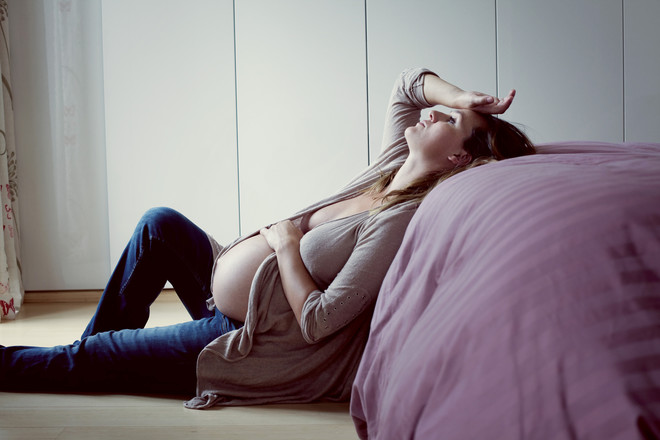It is considered that the most dangerous for the futureThe infant period is the first trimester. When the fetus is only being formed, any malfunction in the mother's body can lead to abnormalities in the development of the child, and even to miscarriage. In the last trimester, there are also many dangers. You can not sleep on your back, so that fetal hypoxia does not develop, your mother suffers from insomnia, gestosis and varicose may appear. Potential troubles are complete. And what about the second trimester? Does it go like clockwork? Scientists at the University of California in San Francisco recently became preoccupied with researching the level of stress of the future mother and his connection with the health of the baby. 151 women participated in the experiment. For their condition, scientists observed during the entire pregnancy and another six months after. Particular attention was paid to the psychological state of future mothers. Specialists measured the level of stress of women, conducting tests every week. During the study, they fixed what problems pregnant women face: work, health, husband and family. In general, they tried to cover all spheres of women's life. This was the first stage of the study. Photo:GettyImagesThe second came when the babies were six months old. Doctors studied how children react to stressful situations by measuring their heartbeat. And it turned out that the children of those women who were exposed to the greatest stress during the second trimester of pregnancy react much more acutely to irritants than their counterparts - the children of women who were lucky enough to do without unnecessary nerves. "This indicates the suppression of the parasympathetic system in children, which is responsible for the speed of returning the heart rate to normal after stress. Reactivity, that is, the body's ability to respond to external stimuli, is very important for human health. If a person is unable to quickly return to normal, the body wears out faster, digestive problems arise," says the head of the study, Dr. Bush. It turns out that an increased level of stress in a mother can leave an imprint on the child's entire life. High reactivity is the culprit of frequent depression and excessive anxiety, problems with behavior and socialization. And even physically such children are weaker – they take much longer to recover from illnesses. The effect of “pregnancy stress” can be smoothed out by providing the child with the most peaceful living conditions in his first six months. “Despite the innate factor, a lot will depend on upbringing and treatment,” Dr. Bush reassures.
Photo:GettyImagesThe second came when the babies were six months old. Doctors studied how children react to stressful situations by measuring their heartbeat. And it turned out that the children of those women who were exposed to the greatest stress during the second trimester of pregnancy react much more acutely to irritants than their counterparts - the children of women who were lucky enough to do without unnecessary nerves. "This indicates the suppression of the parasympathetic system in children, which is responsible for the speed of returning the heart rate to normal after stress. Reactivity, that is, the body's ability to respond to external stimuli, is very important for human health. If a person is unable to quickly return to normal, the body wears out faster, digestive problems arise," says the head of the study, Dr. Bush. It turns out that an increased level of stress in a mother can leave an imprint on the child's entire life. High reactivity is the culprit of frequent depression and excessive anxiety, problems with behavior and socialization. And even physically such children are weaker – they take much longer to recover from illnesses. The effect of “pregnancy stress” can be smoothed out by providing the child with the most peaceful living conditions in his first six months. “Despite the innate factor, a lot will depend on upbringing and treatment,” Dr. Bush reassures.

Making Money with Desserts: Success Stories
Evgeniya Polischuk (Fedutinova) instagram:@evgeniyafedutinovavk.com/janeshomebaking– It all started with baking for family and friends. Gradually, I started posting photos of my baked goods on Instagram – and orders started coming in. I made my first custom-made cake on October 13, 2014, and a little earlier I started making macaroons and cupcakes. You could say that the business “found me”, I am very […]

Soups are cold recipes with photos
Cold cucumber soup with yogurt and lemonsorbet from the chef of the restaurant La Taverna Alexander Zhurkin Photo: Getty Images Ingredients: Plain yoghurt – 125 g Cucumber – 150 g Lemon/lime sorbet – 50 g Cocktail shrimp – 24 g Fresh ginger juice – 1 g Lime juice – 5 g Fresh orange juice – 5 g Parsley – 1 g Pink pepper – 1 g Watercress – […]

barbeque kebab
Pork tenderloin in glaze Photo:Dmitry Bayrak/dbstudioPreparation time: 20 minutes + marinating time.Calories: 454 kcal per serving.For 4 servings: 4 pork tenderloins (approximately 300 g each), 1 onion, 2 cloves of garlic, 1 tsp. lemon zest, 1 tsp. lemon juice, a pinch of ground cumin, coriander and turmeric, 1 tbsp. vegetable […]

Pierre Duacan: dietary recipes: Ducane diet
Beetroot soup Photo:Season’S, Luxury Hotels RepresentationYou will need:· Boiled beetroot – 60 g· Fresh cucumbers – 20 g· Red radish – 20 g· Green onions – 10 g· Egg – 1 pc.· Drinking mineral water – 200 g· Salt – 1 gPreparation:· Boil the egg and beetroot.· Grate the cucumbers, radish and part of the beetroot. Put everything […]





